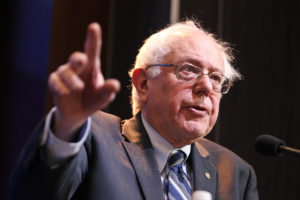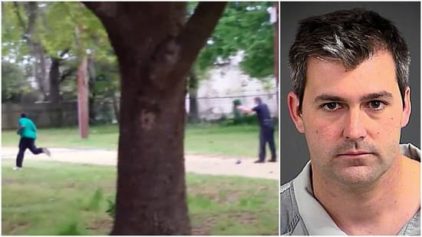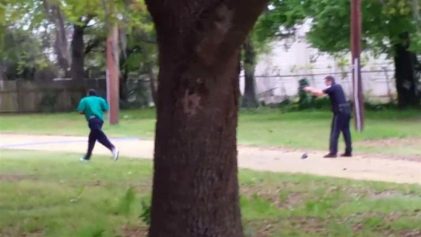Race became front and center of Sen. Bernie Sanders’ presidential campaign as he spoke in South Carolina over the weekend. Although most of the South Carolinians who turned out to see the Independent politician from Vermont were reportedly white, Sanders addressed race head on during his appearance in the Palmetto State in a bid to answer criticism Black Lives Matter movement activists recently lobbed at his campaign.
At a North Charleston rally, Sanders addressed the race-based massacre of nine Black worshipers, including the Rev. Clementa Pinckney, at Emanuel A.M.E. Church in June. He also read the names of Blacks recently killed by police, such as Walter Scott, gunned down by officer Michael Slager in North Charleston. In addition to police violence, Sanders discussed the link between economic hardships and racial injustice. He specifically addressed raising the minimum wage and curbing childhood poverty.
“This is an issue that cuts across the board. It impacts every race,” he said. “And together we are gonna end the shame of having the highest childhood poverty rate of any major country.”
In South Carolina, Sanders met with a number of prominent African-Americans—from pastors and community leaders to activists in Charleston’s Black Lives Matter movement. Although such activists made headlines this month for interrupting Sanders’ campaign events elsewhere, they did not shout him down during his South Carolina appearance. Evidently, Sanders appeased the group by adopting a racial justice platform and using his stop in the South to court Black voters. He’s also hired a Black woman, Symone Sanders, to be his press secretary.
African-Americans play a key role in South Carolina politics, making up more than 50 percent of the state’s Democratic primary voters, according to NPR. Winning the state, which will be one of the first to have a Democratic primary, could give Sanders an early edge over Hillary Clinton. In 2008, Clinton lost South Carolina to Barack Obama, but Sanders’ chances of winning the state are hardly certain. An ABC News/Washington Post poll found that 71 percent of minority Democrat voters support Clinton, while just 9 percent prefer Sanders. Among whites, 58 percent of Democrats support Clinton and 22 percent support Sanders.
Despite this, Sanders framed himself over the weekend as the candidate who most cares about ending racial injustice.
“Let me be very clear,” he said. “Nobody will fight harder to end institutional racism and to reform our broken criminal justice system.”
While Sanders has adopted a racial justice platform, Clinton has yet to do so and recently criticized Black Lives Matters movement leaders for not outlining specific policy guidelines they wanted candidates to adopt. Sanders, in contrast, appears to be garnering support from Black Lives Matter leaders. A Charleston representative of the movement applauded the Vermont senator’s changing outlook on race relations.
“Bernie’s going through his own evolution,” Muhiyidin d’Baha told NPR. “Coming from Vermont and being in the space of white privilege that he’s enjoyed, he’s gonna go through an experience of learning.”
The Black Lives Matter movement may be emerging as the civil rights movement of the 21st century, but its tenets don’t necessarily represent the views of the African-American populace. A Rasmussen poll conducted Aug. 17-18 found that most Blacks take issue with the motto “Black lives matter,” preferring “all lives matter” instead. Only 31 percent of Blacks said the slogan “Black lives matter” closely lines up with their personal beliefs. On the other hand, 64 percent of Blacks said the phrase “all lives matter” closely matches their views. A thousand people of all races were polled, and altogether 78 percent said the “all lives matter” motto most closely matches their beliefs, with 81 percent of whites and 76 percent of minorities agreeing.
Black Lives Matter leaders have condemned the phrase “all lives matter.” Movement co-founder Julius Jones told CNN last week that he considers the term to be threatening.
“And when people say ‘all lives matter,’ it’s actually a violent statement because the only time that people say ‘all lives matter’ is in opposition to Black Lives Matter and it’s the most violent statement of love that you can do,” he said.
It’s unclear exactly why the Blacks polled by Rasmussen said they preferred “all lives matter” to “Black lives matter,” but it’s likely they responded to the terms in their most literal sense. Rather than consider the origin of the term “all lives matter” and that it surfaced in opposition to “black lives matter,” the Rasmussen respondents likely wanted to make it clear that they considered all lives to be valuable and not just those of the individuals who share their racial background.
The Black Lives Matter movement, however, works to raise awareness about the state sanctioned violence Blacks have historically and presently experience in the criminal justice system. Black Lives Matter isn’t about excluding whites but giving vulnerable African Americans, long killed with impunity, the justice they’ve been denied.



